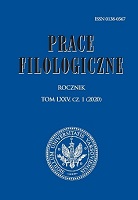Vztah afirmativní a negované formy adjektiv a substantiv z hlediska jejich valence
Relation of affirmative and negative forms of adjectives and nouns from the point of view of their valency
Author(s): Veronika KolářováSubject(s): Lexis, Western Slavic Languages, Philology
Published by: Wydział Polonistyki Uniwersytetu Warszawskiego
Keywords: valency lexicon; negation; adjectives; nouns;
Summary/Abstract: When treating valency of adjectives and nouns in a valency lexicon, it is necessary to decide whether their affirmative and negative forms can be captured in one entry, e.g. (ne)závislý ‘(in)dependent’ and (ne)závislost ‘(in)dependence’. There are two cases that would justify separate entries in the lexicon: first, a difference in meaning between an affirmative form and the corresponding negative form, e.g. volnost ‘freedom’ vs. nevolnost ‘indisposition’; second, a difference in their valency, cf. dependent on and independent of. With the focus on valency complementations expressed by a prepositional group, we show that the valency of negative forms of Czech adjectives and nouns in corpus data is, with few exceptions, the same as valency of the corresponding affirmative forms, e.g. (ne)spokojenýs čím ‘(un)satisfied with sth’, (ne)spokojenost s čím ‘(dis)satisfac-tion with sth’. However, it often differs in frequency. When capturing valency of affirmative and negative forms in one entry in a lexicon, it is important to treat not only the most common cases but also less frequent negative forms and their valency (e.g. nevděčný za něco ‘ungrateful for sth’), as well as the opposite cases in which the frequency of a negative form and its valency considerably outnumbers the frequency of the corresponding affirmative form (e.g. nepostradatelný pro někoho ‘indispensable to sb’).
Journal: Prace Filologiczne
- Issue Year: 75/2020
- Issue No: 1
- Page Range: 293-312
- Page Count: 20
- Language: Czech

